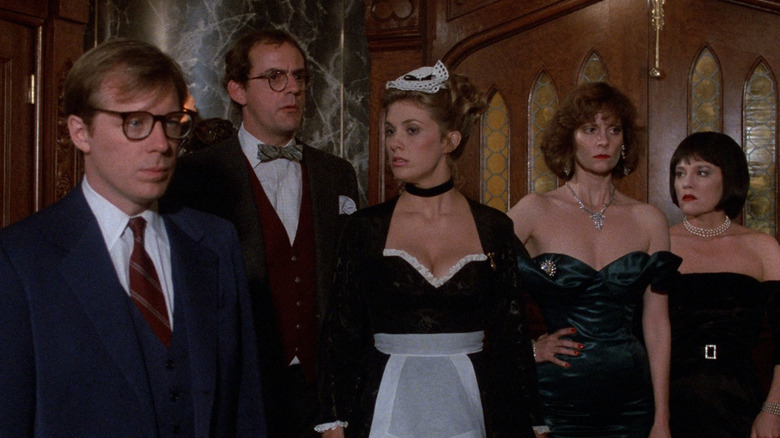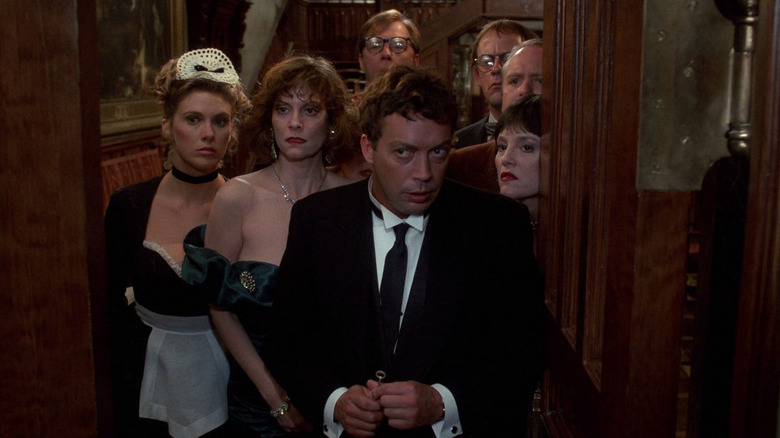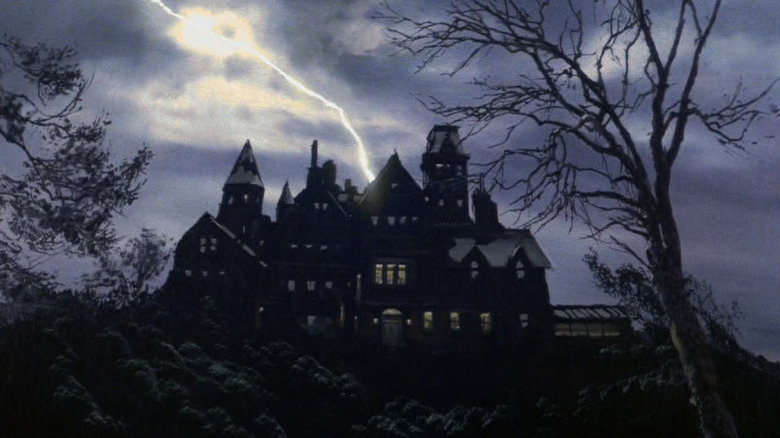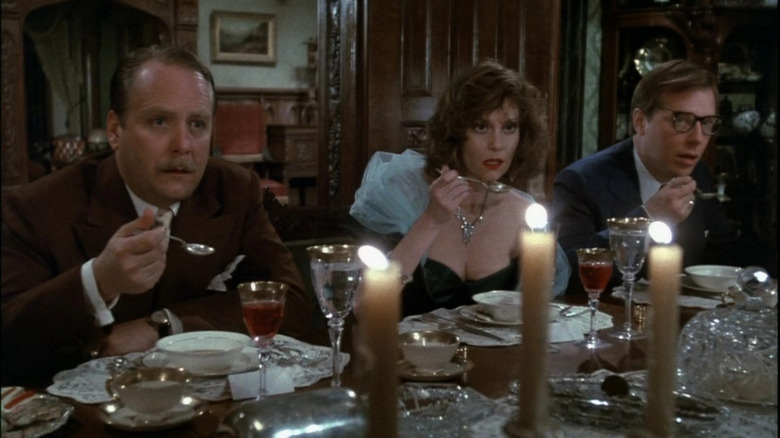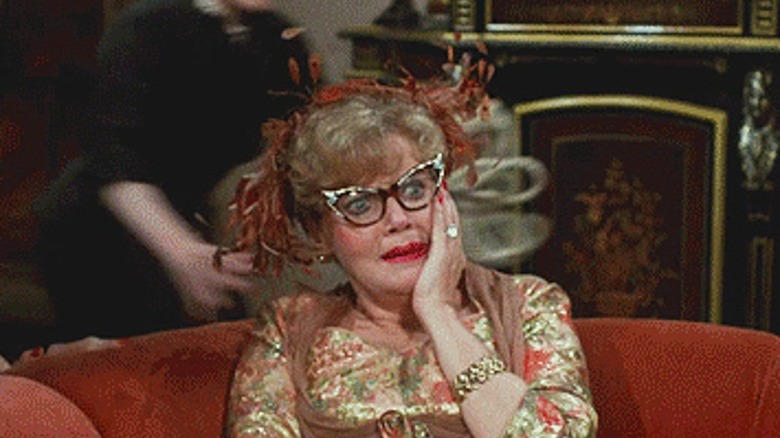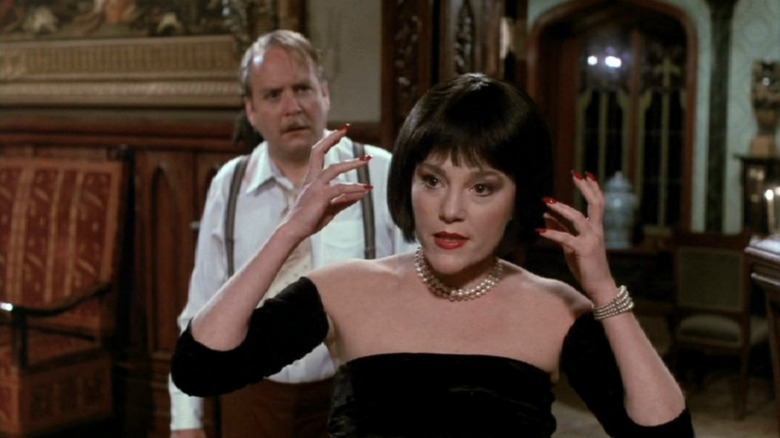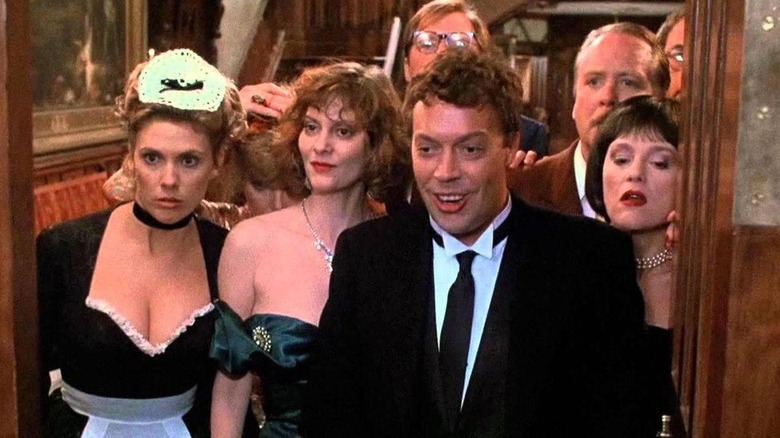How Clue Went From Box Office Flop To Cult Hit
In a year when Barbie gets a star-studded live-action summer movie and "Tetris" was the basis of a corporate espionage thriller, probably no one would raise an eyebrow today if a big-screen adaptation of a classic board game was announced. Forty years ago, it was a pretty outlandish concept, but that didn't deter three big Hollywood players who could seemingly do no wrong at the time.
The big idea was to take "Clue," the venerable old murder mystery board game, and turn it into a motion picture. The people behind the project were Peter Guber, executive producer for Oscar-nominated "Midnight Express" and the welding-and-dancing hit "Flashdance;" Debra Hill, who produced John Carpenter's three name-making movies ("Halloween," "The Fog," and "Escape From New York"); and John Landis, hot after the back-to-back successes of "Animal House," "The Blues Brothers," and "An American Werewolf in London."
Perhaps they had a reason for optimism. There had been a resurgence of interest in murder mysteries during the '70s with several movies based on Sherlock Holmes as varied as "The Seven-Per-Cent Solution" and "Murder by Decree;" Agatha Christie's "Murder on the Orient Express" and "Death on the Nile" received handsome big-screen adaptations; and "Murder By Death," penned by Neil Simon, assembled a dream-team of classic detective parodies (based on Sam Spade, Charlie Chan, Miss Marple, Hercule Poirot, and Nick and Nora Charles) for a playful spoof on the locked room mystery.
"Clue," on the other hand, was not so successful, despite a game cast of talented comic actors. The slapstick farce failed to make its money back at the box office and it regularly makes lists of notorious flops. Almost four decades later, however, it is regarded as a cherished cult classic. So what went wrong and why is it so beloved today?
What happens in Clue again?
"Clue" is set on a stormy night in 1954 as six strangers are summoned to an isolated New England mansion by a mysterious invite. They are greeted by the butler Wadsworth (Tim Curry), who assigns them each a pseudonym to protect their identities. First to arrive is blustering Colonel Mustard (Martin Mull), who is later joined by crotchety Mrs. Peacock (Eileen Brennan), the black widow Mrs. White (Madeline Kahn), lecherous Professor Plum (Christopher Lloyd), closeted Mr. Green (Michael McKean), and vampish Miss Scarlet (Lesley Ann Warren).
Wadsworth quickly reveals the purpose of the invite: All six are being blackmailed by the same person over their shady secrets. He has called the cops with the intent of revealing the extortioner, who arrives as the late-arriving seventh guest, Mr. Boddy (Lee Ving). Boddy appears to have the jump on the butler, however — he gives them all a weapon (candlestick, revolver, lead pipe, etc.) and suggests that someone does away with Wadsworth to prevent their dirty laundry from being exposed.
They all have a motive and the means but, after the lights briefly go out in the study, it is Mr. Boddy lying dead on the floor. Cue much frantic scrambling around as the guests try to discover the killer before the police arrive. A lot of the comedy comes from bawdy farce (typified by Colleen Camp's saucy French maid, Yvette), groan-worthy innuendo and wordplay, and broad slapstick.
Eventually, Wadsworth reveals how the mystery all went down, which is where we reach the movie's big gimmick. "Clue" was shot with three separate endings, which were screened in different theaters at the time of release. The last is probably the most satisfying in relation to the madcap plot — while preposterous, it isn't that much more far-fetched than Agatha Christie's solution in "Murder on the Orient Express."
Clue's journey to the big screen
"Cluedo" was invented by musician Anthony Pratt during World War II, who took inspiration from popular murder mystery games and the novels of Agatha Christie and Raymond Chandler. Devised as a pastime for families taking shelter during the Blitz, Pratt's idea wouldn't go into production until 1949 due to shortages of materials.
The game was an instant hit across the pond, where it became known as just "Clue." Unaware that it was such a success in the States, Pratt sold the rights for £5,000 in 1953 (roughly $142,000 today). It was a tidy sum but maybe he should have held out for more — as of 2018, the game had sold approximately 150 million copies. Over the decades, "Clue" has become a major franchise with multiple editions, musicals, game shows, a TV mini-series, and video game adaptations. To date, there is only one movie version, the brainchild of John Landis.
The director didn't have an ending so he decided to enlist a reputed writer. First up was celebrated playwright Tom Stoppard, who later won an Oscar for his "Shakespeare in Love" screenplay. Even a writer of his caliber struggled to come up with a satisfactory plot, quitting after a year and returning a cheque for the payments he had received. Undeterred, Landis approached composer and lyricist Stephen Sondheim ("West Side Story") to team up with "Psycho" star Anthony Perkins to have a crack, but they asked for more money than the studio was willing to pay.
"Clue" eventually found its way to British writer Jonathan Lynn. He was renowned for his political satire "Yes Minister" for the BBC, and despite his reservations (namely, that the board game didn't have a story), he was won over by Landis's enthusiasm. When Landis dropped "Clue" to make "Spies Like Us," Lynn got to direct the thing as well.
Jonathan Lynn assembled a great cast for Clue
Despite his lack of experience directing a Hollywood movie, Jonathan Lynn was able to attract a great cast of comic actors for "Clue." He turned to his old school pal Tim Curry for the key role of Wadsworth, although he was only third-choice after British comedy legend Leonard Rossiter ("Rising Damp") passed away and Rowan Atkinson was deemed too much of an unknown quantity at that stage of his career.
Joining Curry was Christopher Lloyd, who would become a big star when "Back to the Future" dropped earlier in 1985; the wonderful Eileen Brennan, who had also played part of the ensemble in "Murder by Death;" comedy legend Madeline Kahn, who made such a huge impression in "What's Up, Doc?" and "Blazing Saddles;" Michael McKean, hot from "This Is Spinal Tap," and Martin Mull, best known at the time for satirical shows like "Mary Hartman, Mary Hartman" and "Fernwood 2 Night."
Unfortunately, Lynn's biggest casting coup fell through. Carrie Fisher was originally cast as Miss Scarlet but was dropped when she entered rehab for substance abuse. She was replaced by the very capable Lesley Ann Warren, who gave one of the film's most well-rounded performances.
Once on the expensive $1 million mansion set, Lynn perhaps showed his lack of experience by demanding that his actors say exactly what was written in the screenplay. There was one notable exception: Madeline Kahn's ad-libbed "Flames" speech, which is the funniest thing in the whole movie. I've never been a huge fan of the clunky wordplay in "Clue," and that moment makes me wonder what the movie would have been like if the director had allowed his cast of rich comic talent to really cut loose.
Clue was a big flop in theaters
When "Clue" arrived in theaters in the run-up to Christmas 1985, it was sandwiched between three big hits: "The Jewel of the Nile," "The Color Purple," and "Out of Africa." It was also hamstrung by the multiple endings that John Landis thought would be such a money-spinner at the box office. Jonathan Lynn remembers:
"[John Landis] thought that what would happen was that people, having enjoyed the film so much, would then go back and pay again and see the other endings. In reality, what happened is that the audience decided they didn't know which ending to go to, so they didn't go at all."
That meant that only a third of the audience got to see Madeline Kahn's brilliant moment of improvisation. It could have been worse if the film went out with a fourth ending, which Lynn chopped because he felt it wasn't strong enough. The gimmick had a major flaw: Offering alternative solutions rendered the whodunnit aspect a total irrelevance. Roger Ebert suggested that the best way for Paramount to screen the movie was the format we eventually got on home video and TV, with all three endings back-to-back.
No doubt other factors contributed to the box office failure of "Clue," which fell just short of making back its $15 million budget. In comparison, the Chevy Chase vehicle "Fletch" (also released in 1985) raked in $59 million worldwide from a modest $8 million budget, underlining how badly Landis's comedy brainchild underperformed. Someone had to take the blame and the studio pointed the finger at Lynn. He was put on Hollywood's naughty step for several years before returning with "My Cousin Vinny," a surprise hit that earned Marisa Tomei her only Oscar to date.
The cult comeback of Clue
"Clue" was one of those movies that always seemed to be on the telly when I was a kid, which is how the box office flop slowly built a cult following during the '90s. It was often screened as a cheap schedule filler by cable channels, and home video and word-of-mouth contributed to its increasing appeal among young viewers who didn't give two hoots about box office returns. That made it two times lucky for Tim Curry:
"It's got a life of its own now, this movie ['Clue']... It's a bit of déjà vu for me, really, after 'Rocky Horror.' There are really rabid fans."
There are many cult movies out there but only a few become a staple of midnight screenings. "Clue" followed in the footsteps of "The Rocky Horror Picture Show," itself a flop initially, with shadow cast performances and audience participation. Los Angeles-based Sins O' The Flesh added the zany whodunnit to their repertoire back in 2002 and have performed it every year since. Liz Stockton, one of the troupe's founders, says:
"We probably do, like, three other movies a year, but Clue is the one movie that we do every single year because we know that people love it. They're gonna come dressed up, and we play music from the '50s, and we have a costume contest. It's great."
"Clue" is still as popular 20 years later and it is hard to imagine Rian Johnson's "Knives Out" and "Glass Onion" without its influence. Hasbro recently updated the board game's characters for a whole new audience, and last year it was announced that Oren Uziel ("The Lost City") was writing a remake for Ryan Reynolds. But will it match the madcap charm of the original?
Why is Clue so enduringly popular?
"Clue" is movie comfort food that fits into the "cozy" sub-genre of crime fiction that always seems to flourish when events in the real world get tough. While "cozies" is a relatively new term, their heritage can be traced back to Agatha Christie, the author often credited with establishing the tropes of the format. Then there were "Old Dark House" mysteries like "The Cat and the Canary" and, um, "The Old Dark House." This type of movie was all the rage in the '30s and '40s, usually focusing on a bunch of characters solving a spooky puzzle in an isolated mansion, often on a dark and stormy night.
The two elements combined in Christie's "And Then There Were None," first published in 1939 with a far more offensive title. The novel helped Agatha Christie become one of the best-selling authors of all time and provided one of the inspirations from Anthony Pratt's board game.
While murder mysteries have never really gone away, they enjoyed another surge in popularity in the '70s. Big-screen outings for Arthur Conan Doyle and Agatha Christie's famous sleuths coincided with the arrival of an absent-minded homicide detective named Frank Colombo.
"Colombo" made an unexpected comeback during the pandemic, comforting viewers with its low-stakes murder-of-the-week format. The resurgence of the '70s classic blended seamlessly with new shows like "Poker Face," which evoked the fuzzy vibe of its predecessor, and "Only Murders in the Building," which blended comedy with an involving mystery.
From this, maybe we can deduce that when current events look bleak (World War II, the Vietnam War, and COVID-19), viewers take comfort in cozy murder mysteries. Perhaps it is because violence is a contained force in these shows and movies, we know the killer will get always caught, and "Clue" fits right in with this category of entertainment.
